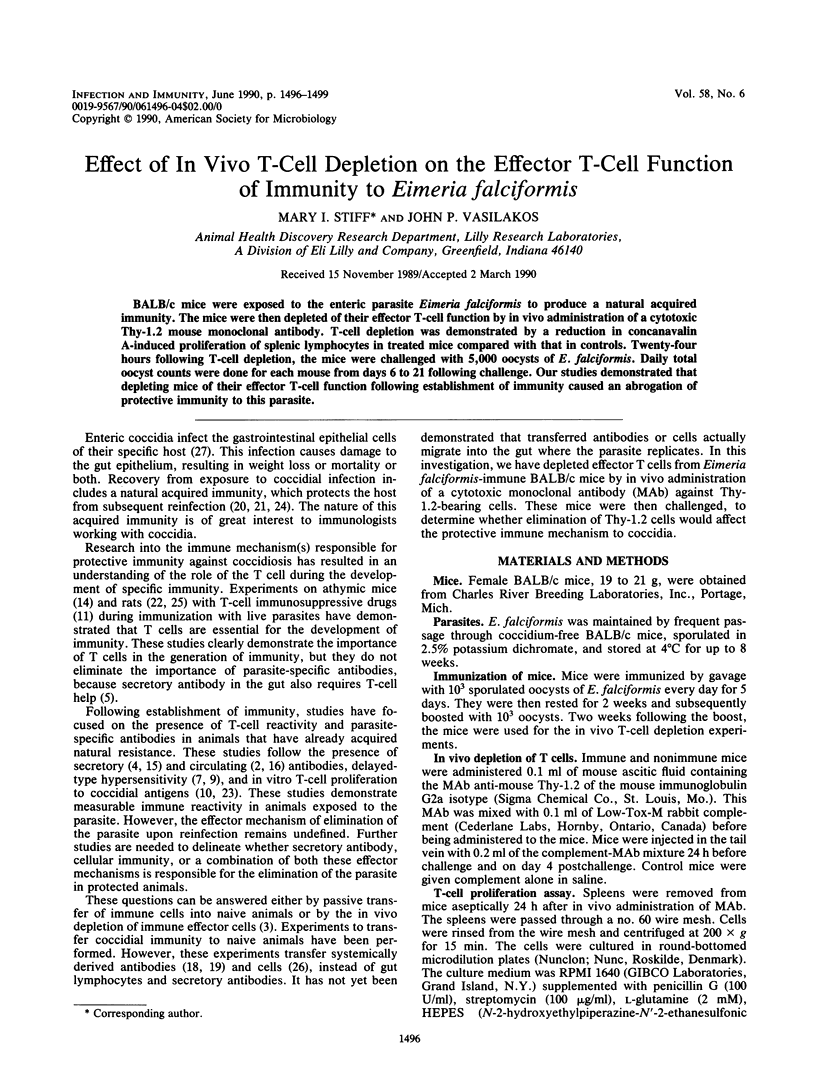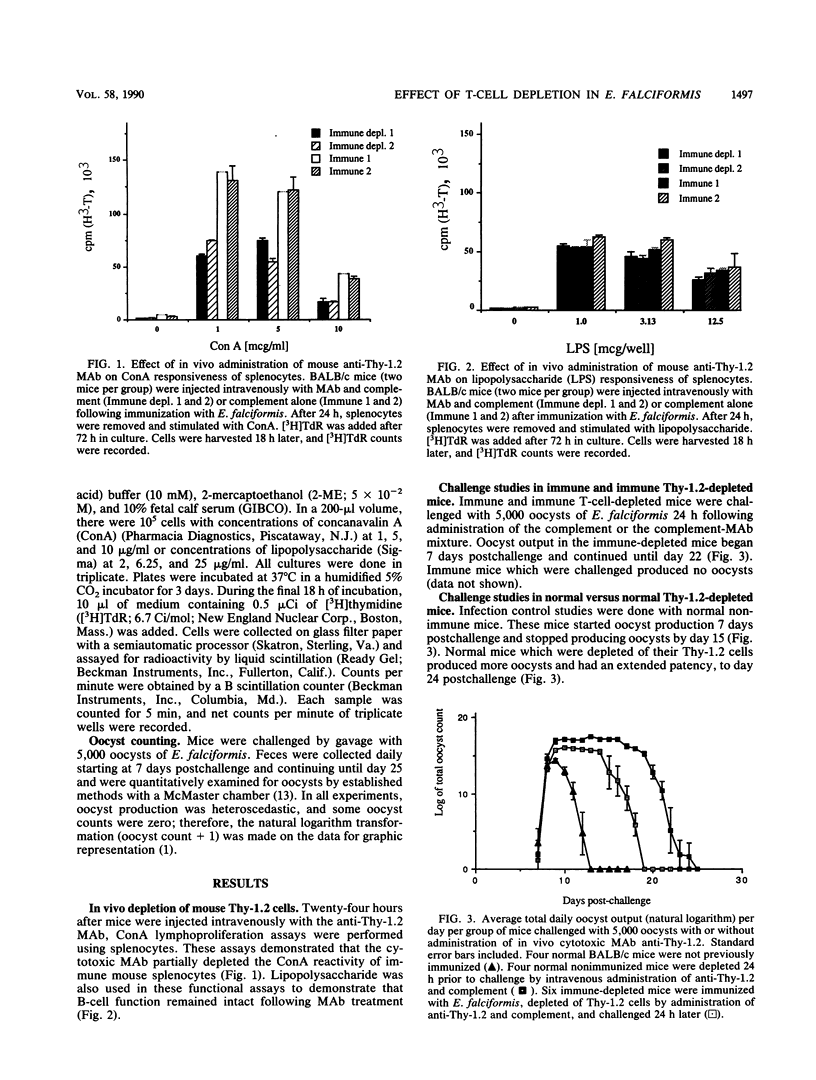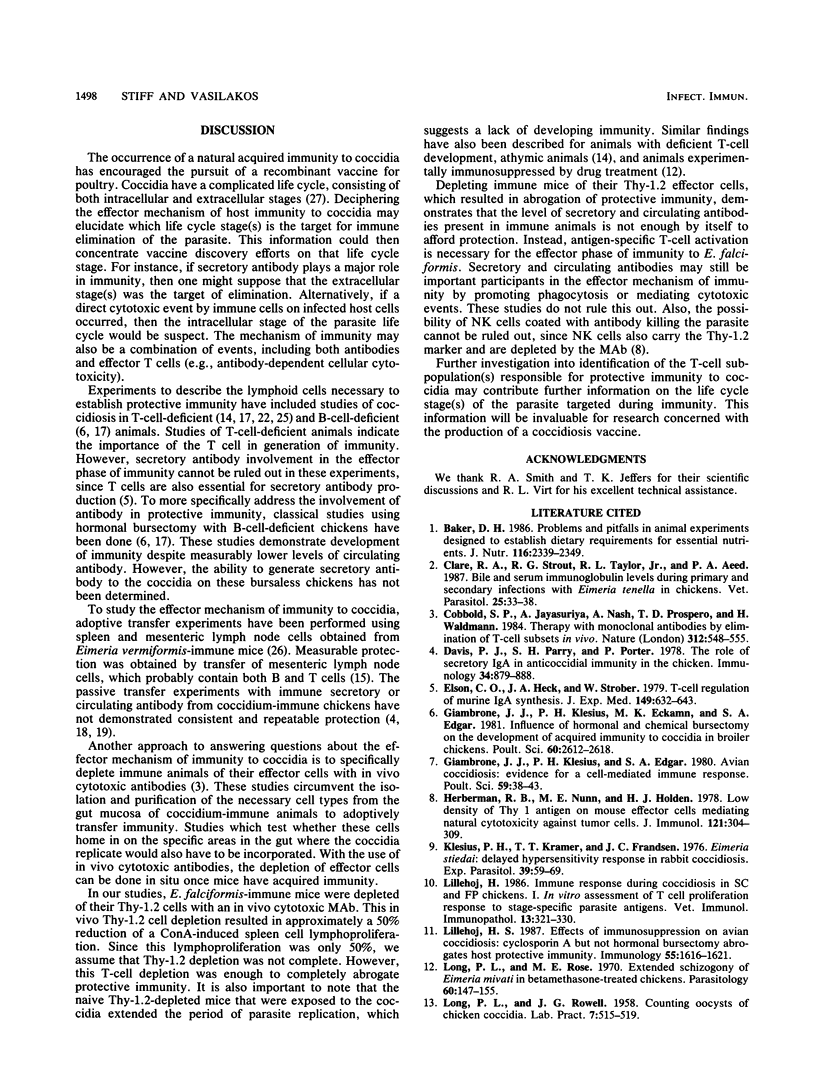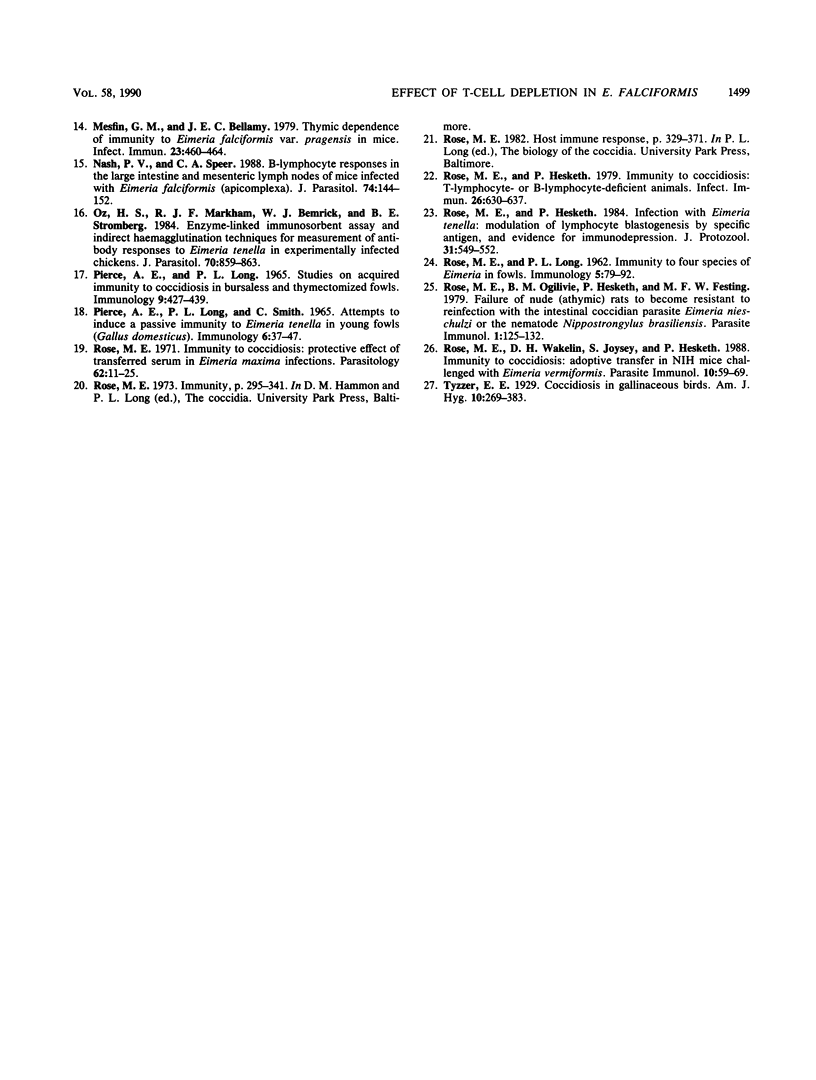Abstract
BALB/c mice were exposed to the enteric parasite Eimeria falciformis to produce a natural acquired immunity. The mice were then depleted of their effector T-cell function by in vivo administration of a cytotoxic Thy-1.2 mouse monoclonal antibody. T-cell depletion was demonstrated by a reduction in concanavalin A-induced proliferation of splenic lymphocytes in treated mice compared with that in controls. Twenty-four hours following T-cell depletion, the mice were challenged with 5,000 oocysts of E. falciformis. Daily total oocyst counts were done for each mouse from days 6 to 21 following challenge. Our studies demonstrated that depleting mice of their effector T-cell function following establishment of immunity caused an abrogation of protective immunity to this parasite.
Full text
PDF



Selected References
These references are in PubMed. This may not be the complete list of references from this article.
- Baker D. H. Problems and pitfalls in animal experiments designed to establish dietary requirements for essential nutrients. J Nutr. 1986 Dec;116(12):2339–2349. doi: 10.1093/jn/116.12.2339. [DOI] [PubMed] [Google Scholar]
- Clare R. A., Strout R. G., Taylor R. L., Jr, Aeed P. A. Bile and serum immunoglobulin levels during primary and secondary infections with Eimeria tenella in chickens. Vet Parasitol. 1987 Jun;25(1):33–38. doi: 10.1016/0304-4017(87)90062-8. [DOI] [PubMed] [Google Scholar]
- Cobbold S. P., Jayasuriya A., Nash A., Prospero T. D., Waldmann H. Therapy with monoclonal antibodies by elimination of T-cell subsets in vivo. Nature. 1984 Dec 6;312(5994):548–551. doi: 10.1038/312548a0. [DOI] [PubMed] [Google Scholar]
- Davis P. J., Parry S. H., Porter P. The role of secretory IgA in anti-coccidial immunity in the chicken. Immunology. 1978 May;34(5):879–888. [PMC free article] [PubMed] [Google Scholar]
- Elson C. O., Heck J. A., Strober W. T-cell regulation of murine IgA synthesis. J Exp Med. 1979 Mar 1;149(3):632–643. doi: 10.1084/jem.149.3.632. [DOI] [PMC free article] [PubMed] [Google Scholar]
- Giambrone J. J., Klesius P. H., Eckamn M. K., Edgar S. A. Influence of hormonal and chemical bursectomy on the development of acquired immunity to coccidia in broiler chickens. Poult Sci. 1981 Dec;60(12):2612–2618. doi: 10.3382/ps.0602612. [DOI] [PubMed] [Google Scholar]
- Herberman R. B., Nunn M. E., Holden H. T. Low density of Thy 1 antigen on mouse effector cells mediating natural cytotoxicity against tumor cells. J Immunol. 1978 Jul;121(1):304–309. [PubMed] [Google Scholar]
- Klesius P. H., Kramer T. T., Frandsen J. C. Eimeria stiedai: delayed hypersensitivity response in rabbit coccidiosis. Exp Parasitol. 1976 Feb;39(1):59–68. doi: 10.1016/0014-4894(76)90010-2. [DOI] [PubMed] [Google Scholar]
- Lillehoj H. S. Immune response during coccidiosis in SC and FP chickens. I. In vitro assessment of T cell proliferation response to stage-specific parasite antigens. Vet Immunol Immunopathol. 1986 Dec;13(4):321–330. doi: 10.1016/0165-2427(86)90025-5. [DOI] [PubMed] [Google Scholar]
- Long P. L., Rose M. E. Extended schizogony of Eimeria mivati in betamethasone-treated chickens. Parasitology. 1970 Feb;60(1):147–155. doi: 10.1017/s0031182000077313. [DOI] [PubMed] [Google Scholar]
- Mesfin G. M., Bellamy J. E. Thymic dependence of immunity to Eimeria falciformis var. pragensis in mice. Infect Immun. 1979 Feb;23(2):460–464. doi: 10.1128/iai.23.2.460-464.1979. [DOI] [PMC free article] [PubMed] [Google Scholar]
- Nash P. V., Speer C. A. B-lymphocyte responses in the large intestine and mesenteric lymph nodes of mice infected with Eimeria falciformis (Apicomplexa). J Parasitol. 1988 Feb;74(1):144–152. [PubMed] [Google Scholar]
- PIERCE A. E., LONG L. P., HORTON-SMITH C. Attempts to induce a passive immunity to Eimeria tenella in young fowls (Gallus domesticus). Immunology. 1963 Jan;6:37–47. [PMC free article] [PubMed] [Google Scholar]
- Pierce A. E., Long P. L. Studies on acquired immunity to coccidiosis in bursaless and thymectomized fowls. Immunology. 1965 Nov;9(5):427–439. [PMC free article] [PubMed] [Google Scholar]
- ROSE M. E., LONG P. L. Immunity to four species of Eimeria in fowls. Immunology. 1962 Jan;5:79–92. [PMC free article] [PubMed] [Google Scholar]
- Rose M. E., Hesketh P. Immunity to coccidiosis: T-lymphocyte- or B-lymphocyte-deficient animals. Infect Immun. 1979 Nov;26(2):630–637. doi: 10.1128/iai.26.2.630-637.1979. [DOI] [PMC free article] [PubMed] [Google Scholar]
- Rose M. E., Hesketh P. Infection with Eimeria tenella: modulation of lymphocyte blastogenesis by specific antigen, and evidence for immunodepression. J Protozool. 1984 Nov;31(4):549–553. doi: 10.1111/j.1550-7408.1984.tb05500.x. [DOI] [PubMed] [Google Scholar]
- Rose M. E. Immunity to coccidiosis: protective effect of transferred serum in Eimeria maxima infections. Parasitology. 1971 Feb;62(1):11–25. doi: 10.1017/s0031182000071249. [DOI] [PubMed] [Google Scholar]
- Rose M. E., Ogilvie B. M., Hesketh P., Festing M. F. Failure of nude (athymic) rats to become resistant to reinfection with the intestinal coccidian parasite Eimeria nieschulzi or the nematode Nippostrongylus brasiliensis. Parasite Immunol. 1979 Summer;1(2):125–132. doi: 10.1111/j.1365-3024.1979.tb00700.x. [DOI] [PubMed] [Google Scholar]
- Rose M. E., Wakelin D., Joysey H. S., Hesketh P. Immunity to coccidiosis: adoptive transfer in NIH mice challenged with Eimeria vermiformis. Parasite Immunol. 1988 Jan;10(1):59–69. doi: 10.1111/j.1365-3024.1988.tb00203.x. [DOI] [PubMed] [Google Scholar]
- Saatara Oz H., Markham R. J., Bemrick W. J., Stromberg B. E. Enzyme-linked immunosorbent assay and indirect haemagglutination techniques for measurement of antibody responses to Eimeria tenella in experimentally infected chickens. J Parasitol. 1984 Dec;70(6):859–863. [PubMed] [Google Scholar]


